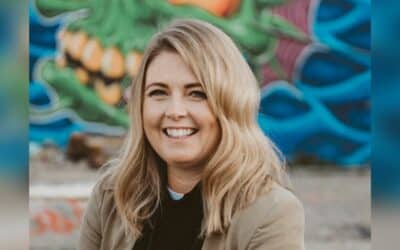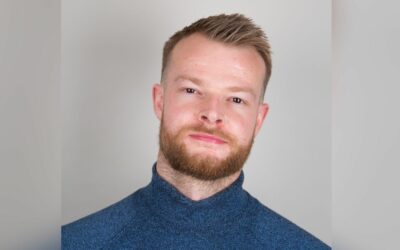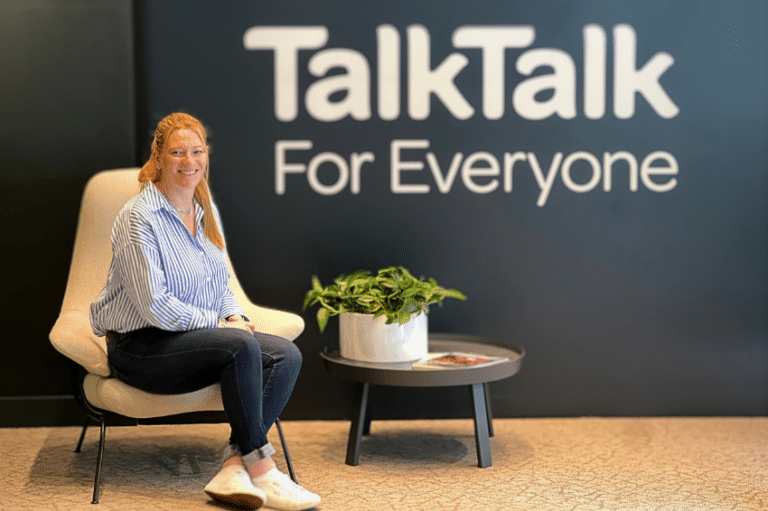Ruth Kennedy joined TalkTalk Business back in 2011 initially as a carrier services manager.
After a number of promotions and senior roles, she was appointed as managing director earlier this year.
The shareholders of TalkTalk set up a special purpose vehicle and recently acquired TalkTalk Business Direct (TTBD) for £95 million, with the company continuing to remain headquartered in Salford.
From a five year stint in the army to joining TalkTalk Business, we find out all the lessons Kennedy has learnt across her life and career…
Which single daily habit or practice could you not do without?
One thing I like to do a lot of is running – I find it really helps to clear my head and makes me feel refreshed. I’m a big advocate for starting the day off on a positive note and, for me, running is a powerful way to manage my stress and make sure I’m taking care of my wellbeing. I think that’s an important habit to maintain and also, it’s good to challenge myself outside of work.
What’s been your luckiest break?
I wouldn’t say that I’ve had a specific lucky break. I’ve always worked hard and been very focused, and I think that’s been the driver behind my successes. For me, it’s empowering to remember that you can be proactive, motivated and take practical steps towards achieving your goals. You don’t need to wait for an opportunity to present itself to you; I’ve learned that it’s important to actively seek out and pursue those moments and experiences that will help you develop and grow.
However, I do feel lucky to work at TalkTalk and for all the opportunities the business has given me. It’s a brilliant, dynamic and inclusive company that’s allowed me to take on a variety of different roles which have enabled me to push myself out of my comfort zone to try out new things and develop as a person.
I first joined the business as a carrier manager and have progressed through a number of different roles before becoming the managing director at TalkTalk Business. I was lucky to find myself in an environment where this was possible, and ultimately this has driven me to work hard to become capable of taking the next steps.
What’s your best failure?
Interestingly, my best failure would be leaving the army. I had an amazing time in the Royal Signals – it truly was a great experience. I completed five years in the end and, whilst a part of me wishes I did longer, leaving when I did was definitely the best decision. After all, it was this that allowed me to enter the telecoms industry right as it was booming.
The Royal Signals really was the start of my career development, I gained valuable leadership and industry experience that I could take forward to my next job, and eventually to TalkTalk. As far as failures go, I’d say that’s a pretty good outcome.
What is the best investment you’ve ever made, either financial or time?
I’m incredibly passionate about investing time into opportunities and experiences outside of my day job. I believe one of the best ways to do that is through supporting charities, especially those that help causes that are important to the individual. I am lucky to have previously supported a great charity called Green Corridor, as chair of Trustees. Green Corridor is a charity that works to create opportunities for post-16 learners with special educational needs. My time with Green Corridor has been amazing, not only because of the work Green Corridor does and the fantastic support we provide to the learners and their families, but also to work with such a dedicated and diverse group of people in a new sector.
During my previous chair position at Green Corridor, I worked closely with the CEO and wider SLT, with the CEO looking after the day-to-day operations, where myself and the board were responsible for the charity’s strategic direction. The most rewarding thing about previously working with Green Corridor is watching the learners achieve the outcomes set, which can range from independent living to securing part-time or full-time work. It was a lot of responsibility, but very fulfilling. I would encourage anyone who had the time or means to get involved with charity work, particularly if it’s for a cause that they’re passionate about.
Which podcast or book would you recommend others to read and why?
The one book – or in this case magazine – that I’ll always recommend that people read is The Harvard Business Review. It’s a bit of a time investment, but brilliant! Reading different people’s stories is always interesting and inspiring. There is a lot of value in understanding other people’s position and engaging with different voices and ideas is a great way to learn about the world outside of telecoms.
What one piece of advice would you give your 21-year-old self?
I’d give myself the same advice I now give my 16-year-old daughter: always think about people’s intent and remember that this is always going to involve your personal interpretation.
When we’re faced with challenging situations, it’s easy to take something out of context. It’s important to stop, think and not react – always think about the bigger picture of what you’re trying to achieve. I believe exploring people’s intentions helps you better understand the context and helps build resilience when working with others.
Who or what has had the single biggest influence on your working life?
My time in the army has been a huge influence for me. It was where I learned about what truly makes a good leader, and about the importance of being motivated, disciplined and organised! As you would expect! The variety of experiences I was exposed to in the army also taught me a lot about working in a team and the importance of teamwork.
Collaborating and understanding different personalities and ensuring everyone knows the role they play is crucial in the army. I’ve learnt a lot throughout my career, but my leadership skills were developed in the Army and I still apply them to this day.
Tell us something about you that would surprise people.
I was fluent in morse code! Both sending and receiving! I could probably still do it now, but I must admit, it would take a bit (or a lot) of practice.
How will the COVID crisis change work for the better?
Although we’re out of the pandemic now, Covid-19 has done a lot for promoting flexible working and has given people the chance to re-address the work life balance.
At TalkTalk Business, our working hours are flexible and we give our people the opportunity to work with their manager to really make the flexibility work for them. This means people have the opportunity to do school pick-ups or drop-offs or go to the gym before work if they want to. I have children, so I know how valuable it is to be present at the school gates.
Working somewhere that can fit around your life and commitments outside of your day job is amazing. Flexible working means different things to different people, but ultimately this is a benefit to everyone’s overall wellbeing. People in general are more conscious now of having a good work/life balance, which I think is huge positive to have come from the pandemic.
Of course, flexibility is always a two-way thing: for it to be successful it has to work for people in their personal and professional lives. But when it’s done effectively, it can really benefit both.
What does success look like to you?
I do believe that you should take a learning out of every situation – either good or bad. As long as you look back, reflect, understand what went well or what didn’t and learn, that is a success.
There will always be challenges in life, but every experience – even the negatives ones – is valuable. Ensuring that you take something positive from any setback you face is a vital part in continuing to develop yourself.











